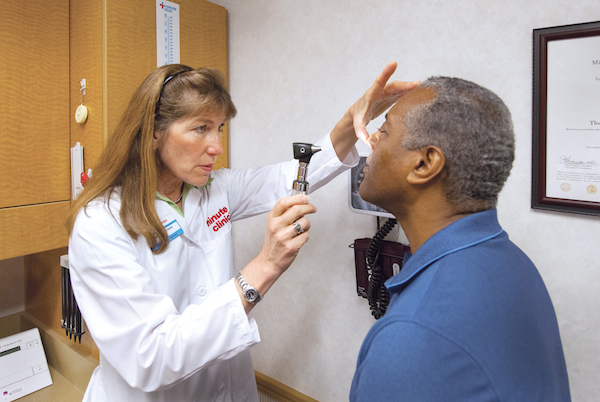She was emphatic about having a doctor who knew her name and cared to ask her opinion. Millie was not happy to get an influenza chance at a retail center, so there is no doubt she would not look for care at one when she was ill. In reality, I visited her home to give her the influenza vaccine myself for many years (Where to report a health clinic). She would frequently speak fondly about the doctor she had as a kid. It is during one of those house gos to when I first found out Millie had lost her father to influenza throughout the epidemic of 1918. It seems perverse to deliver health care services at a place called the Minute, Center.
While CVS and Walgreens see geriatric primary care yet another untapped gold mine, for me, the relationship memorialized in Norman Rockwell's "Doctor" Substance Abuse Treatment resonates as much today as it did 90 years ago. Seamless communities are no match for a "determination to put professional competence at the feet of childhood magic." The bond Millie and I shared was wonderful. And every client is worthy of a physician who knows their name. Niran S. Al-Agba is a pediatrician and can be reached at her self-titled website, Dr. Niran Al-Agba. Image credit: Shutterstock. com.
According to researchers, 58% of retail center gos to for low-acuity conditions represented new utilization, while 42% represented substitutions for a visit to a physician workplace or emergency situation department. This recommends most consumers using retail centers weren't utilizing them as an option to care at a costlier site. In reality, the benefit of retail care might be driving individuals to look for care at centers that they might otherwise not have looked for out. The study focused on 11 low-acuity conditions-such as upper-respiratory infections, urinary system infections, and influenza-which represent more than 62% of all visits in retail health settings. It included 519,542 patients with a minimum of one retail center check out and 861,557 other enrollees selected at random; the arbitrarily selected patients were selected based upon resemblances with clients who went to retail centers (similar demographics such as sex, age, location, and health status).
Researchers specified retail clinics as those situated in pharmacies, grocery shops, and "big-box stores" such as Walmart and Target. The centers mostly provide care for a restricted set of low-acuity intense conditions such as urinary system infections in addition to preventive services such as immunizations. A nurse is assessing a new client at a public health clinic. Which of the following areas. Mehrotta, Ateev Mehrotta, MD, associate teacher of health care policy and medication at Harvard Medical School and one of the research study's researchers, states he wasn't amazed by his team's findings. If you make care more hassle-free for patients, they are more most likely to access it, he states. Emily Zuehlke, research consultant with The Board of advisers Business consulting company, keeps in mind that while retail centers have acted as "a pressure-relief valve for doctors' offices," a long-lasting view is essential when considering how these clinics effect health care costs.
Some Known Questions About Check over here Where Is The Nearest Health Clinic.

Long-term savings might for that reason surpass the $14 per individual expense that this research study shows can result from increased retail center utilization to manage low-acuity conditions," states Zuehlke, citing a 2013 research study released in The American Journal of Managed Care. Hafner, Most health system executives have a tough time figuring out whether they should compete or team up with retail clinics, states Zach Hafner, partner at The Board of advisers Business. Initially, many executives-especially those with trusted brands-decide that the clear option is to contend. However Hafner frequently counsels that this viewpoint is "completely - cleveland clinic: health library." What to think about rather, says Hafner, is an "outside in" technique, concentrating on what consumers want-and, namely, that's much better, or perhaps instant, hassle-free access to the health care system, which a retail clinic can assist offer.
In some markets the health system is better located than the retail center service provider, and partnering with the retail clinic doesn't make one of the most sense, he says. Health system collaborations with CVS-Minute Centers and The Little Center are branded associations with medical oversight, while collaborations with Walmart are examples of a health system having complete control or operational control over the retail clinic. For instance, providers triage the recommendations in network and straight accumulate clinic earnings, states Zuehlke. Collaborating with http://daltonzrqu859.image-perth.org/some-ideas-on-a-nurse-in-a-mental-health-clinic-is-assessing-a-client-who-has-a-history-of-mania-you-should-know retail centers is likewise a good move for payers who have an interest in establishing a narrow network product while offering convenient alternatives for members.
In addition, Hafner says, for self-insured companies, access to look after employees at retail clinics is a "real satisfier" due to the fact that it doesn't require negotiating rates with a variety of companies. Aine Cryts is an author based in Boston.
Research Short Three-fourths of retail centers lie in the Southern and Midwestern United States. Retail centers generally serve more youthful grownups who do not have a main care supplier. For a select group of conditions, retail centers deliver care of equivalent quality compared with other settings. Accessibility of a retail clinic does not deter individuals from going to the emergency department. Though promoted as a means of decreasing health care costs, retail centers somewhat increase healthcare utilization and, subsequently, healthcare costs. Retail centers are medical centers located in pharmacies, grocery stores, and "big box" shops, such as Target and Walmart.
